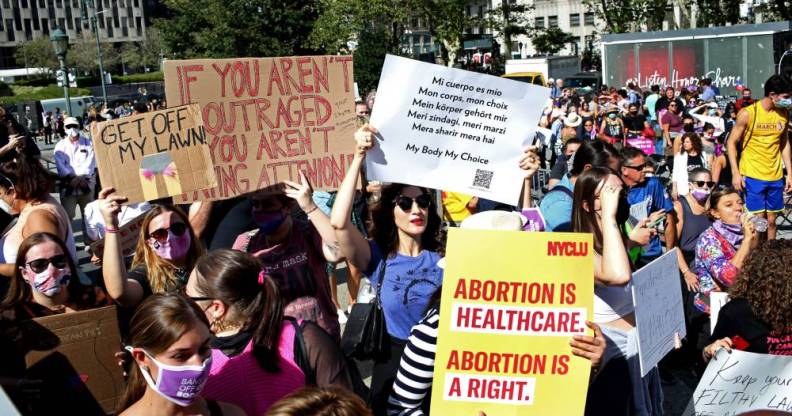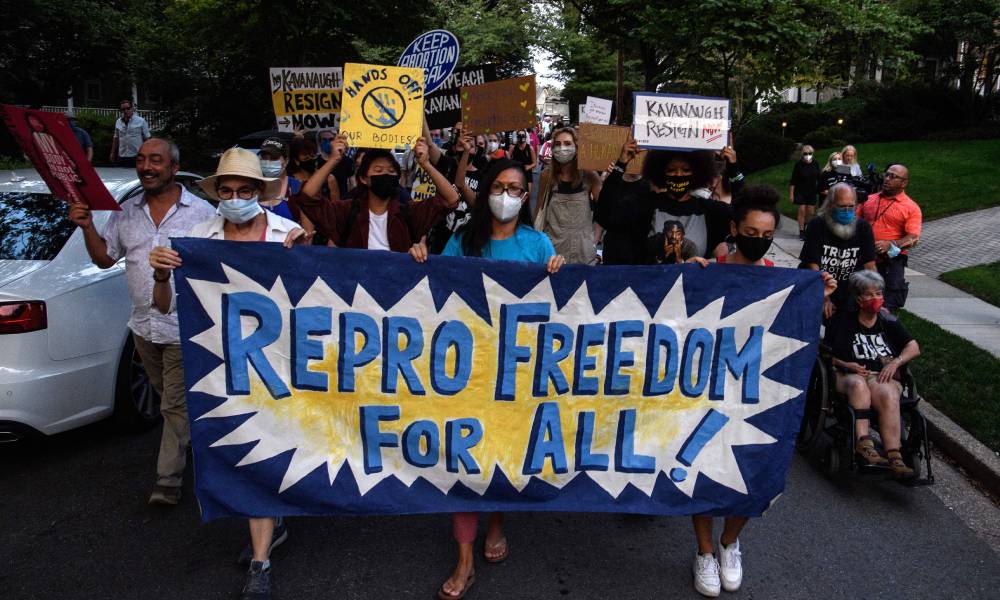Texas’ reviled abortion ban temporarily blocked by judge: ‘The fight has only just begun’

Crowds gather in Foley Square for the Women’s March on 2 October 2021 in New York City as part of nationwide protests against the new abortion law in Texas. (Getty/Yana Paskova)
A US federal judge has temporarily blocked the near-total ban on abortion in Texas, dealing a huge blow to the “unprecedented and aggressive” law.
District judge Robert Pitman granted a request by the Biden administration to immediately halt the enforcement of the Republican-backed law SB 8, which prevents people from obtaining an abortion after six weeks of pregnancy.
He described the new law as an “unprecedented and aggressive scheme” to deprive people of their right to choose.
“This court will not sanction one more day of this offensive deprivation of such an important right,” Pitman declared in the 113-page ruling.
The law, which came into effect on 1 September after the Supreme Court refused to block it, effectively bans abortions from as early as six weeks into pregnancy, which is before many people are aware that they are pregnant.
It has also been particularly controversial because of the way it is enforced. The law effectively deputised private citizens to file lawsuits and seek a $10,000 penalty for violators – from doctors to cab drivers – who aid a person in obtaining an abortion.
The Biden administration argued the Texas ban flew in the face of the constitutional right to abortion as granted under the landmark Roe v Wade ruling. The justice department filed an emergency motion to block enforcement of the law while it pursued legal action.
During a hearing on the case earlier this month, Justice Department attorney Brian Netter argued that Texas “resorted to an unprecedented scheme of vigilante justice” that must be struck down.
White House press secretary Jen Psaki said the ruling is an “important step forward restoring the constitutional rights” of people across Texas.
“SB 8 not only blatantly violates the right to safe and legal abortion established under Roe v Wade, but it creates a scheme to allow private citizens to interfere with that right and to evade judicial review,” Psaki said.
She added: “The fight has only just begun, both in Texas and in many states across this country where women’s rights are currently under attack.
“That’s why the president supports codifying Roe v Wade, why he has directed a whole-of-government response to SB 8, and why he will continue to stand side-by-side with women across the country to protect their constitutional rights.”
According to ABC News, Texas officials immediately appealed the judgement to another court, which could issue a stay of Pitman’s order and allow the law to remain in effect as litigation continues.

Activists march to US supreme court justice Brett Kavanaugh’s house on 13 September 2021, following the court’s decision to uphold Texas’ stringent abortion law. (Nicholas Kamm/AFP via Getty)
Brigitte Amiri, deputy director of the ACLU reproductive freedom project, described the ruling as offering a “sigh of relief” but warned the “threat of Texas’ abortion ban still looms over the state as cases continue to move through the courts”.
“We already know the politicians behind this law will stop at nothing until they’ve banned abortion entirely,” Amri said.
Amri added that the result of the law has been devastating as “people who need abortion care and have resources have been forced to flee the state” while “those without resources” have been “forced to remain pregnant against their will”.
“This fight is far from over, and we’re ready to do everything we can to make sure every person can get the abortion care they need regardless of where they live or how much they make,” Amri said.
Trans athlete and activist Schuyler Bailar recently called on people to advocate for LGBT+ inclusion in the fight for reproductive rights. He told crowds gathered at the Women’s March in Washington DC on Saturday (2 October) that abortion rights are an LGBT+ issue as well as a woman’s issue.
“I am a transgender man, which means that although I am a man, I was assigned female at birth, which means that I have a uterus,” Bailar said. “Which means I could get pregnant. Which means that I could need an abortion.”
"This is a women's issue and it is also a transgender man's issue": Schuyler Bailar, the first transgender athlete to compete on an NCAA Division 1 men’s team, talks LGBTQ inclusion at Saturday's Women’s March rally for abortion justice pic.twitter.com/2nJzq3jgcN
— CBS News (@CBSNews) October 2, 2021
He reminded the crowds that “people of all genders can have abortions” and should have “safe and legal access to abortions”.
“This is a women’s issue, and it is also a transgender man’s issue,” Bailar declared.
He continued: “It is also a non-binary person’s issue. It is also a genderqueer, genderfluid, trans-masculine person’s issue.
“This is about all of us.”

